

DIY essential oil storage solutions. Chemical Families, Therapeutic Properties, and Safety Considerations. Like this post?
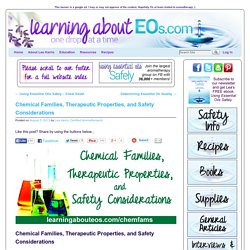
Share by using the buttons below... The components that essential oils are made up of are classified into chemical families according to their molecular structure. Knowing the chemical families and their therapeutic properties can really help us learn which essential oils to use for various health concerns. There are also safety concerns within each family that are to be taken into consideration as selections are made. Here is a brief summary of the different chemical families, the therapeutic properties, and any safety concerns. Monoterpenes This chemical family is made up of components which evaporate quickly and are considered “top notes” as they are the first aromas to hit your nose in a blend. Monoterpenes generally are: Essential oils with more than 60% monoterpenes include: Bergamot, Black Pepper, Cypress, Frankincense, Grapefruit, Juniper Berry, Lemon, Opopanax, Sweet Orange, Ravintsara, Rosemary, and Siberian Fir.
Sesquiterpenes Monoterpenols Sesquiterpenols Esters. Which is the Best Essential Oil Company? “Which is the Best Essential Oil Company?”
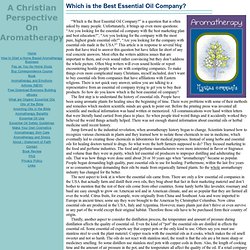
Is a question that is often asked by many people. Unfortunately, it brings up even more questions: “Are you looking for the essential oil company with the best marketing plan and best education?” , “Are you looking for the company with the most pure, highest grade essential oils?” , “Are you looking for the company with essential oils made in the ?” This article is in response to several blog posts that have tried to answer this question but have fallen far short of any real concrete answers.
The first step is to understand the history of essential oils. Jump forward to the industrial revolution, when aromatherapy history began to change. Essential oils: Use spiritual discernment - Samaritan Ministries International. Part 3 of a series.
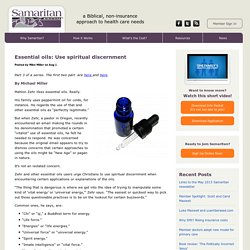
The first two part are here and here. By Michael Miller. New Essential Oil Label Guidelines. The American Herbal Products Association (AHPA) announced on August 2nd that it has created a new guidance policy for the labeling of essential oils sold for topical use and offered for retail trade.
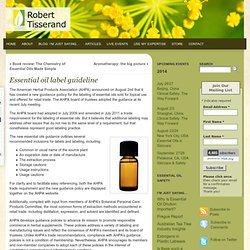
The AHPA board of trustees adopted the guidance at its recent July meeting. The AHPA board had adopted in July 2009 and amended in July 2011 a trade requirement for the labeling of essential oils. But it believes that additional labeling may address other issues that do not rise to the same level of a requirement, but that nonetheless represent good labeling practice. The new essential oils guidance outlines several recommended inclusions for labels and labeling, including: Common or usual name of the source plantAn expiration date or date of manufactureThe extraction processStorage cautionsUsage instructionsUsage cautions For clarity and to facilitate easy referencing, both the AHPA trade requirement and the new guidance policy are displayed together on the AHPA website. Not Just for Christmas: 12 Biblical Essential Oils - Naturally His.
I stand amazed.
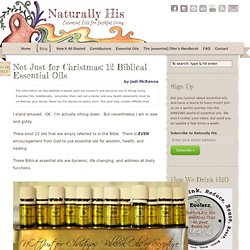
OK. I’m actually sitting down. Aromatherapy for Christians. Welcome to the Essential Survival store! Intermediate Herbal Course: Online Herbal Course. The Intermediate Online Herbal Course is an Apprenticeship for Distant Learners.
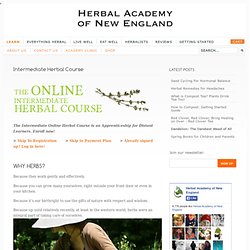
Enroll now! > Skip To Registration > Skip to Payment Plan > Already signed up? Log in here! Because they work gently and effectively. Because you can grow many yourselves, right outside your front door or even in your kitchen. Because it’s our birthright to use the gifts of nature with respect and wisdom. Because up until relatively recently, at least in the western world, herbs were an integral part of taking care of ourselves. Health doesn’t come from plastic bottles. If you want to learn more about herbs as medicine and as food, and if you’re just too busy to enroll in an in-person program, join us for a comprehensive and convenient online herbal course you can complete anywhere and anytime—right on your laptop! The Intermediate Herbal Course is your online doorway into the wild and wonderful world of plant medicine. Which Essential Oil Companies Should YOU Buy From? My surprising findings on my quest to find the best - TheHippyHomemaker.
I am most likely going to piss off some people with this post, but the information that I found was too good to keep to myself and keep you guys in the dark.
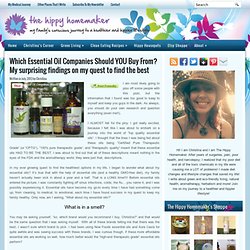
As always, you should do your own research and question everything (even me!!). I ALMOST fell for the ploy. Therapeutic grade oils - read all about it! « Robert Tisserand. Dear Massage Magazine, I submitted an article, which you published as a Guest Editorial on page 22 of your March 2010 issue, entitled Essential Oils: Premium Quality Yields Premium Results.

On page 10, your Contents Page, this was listed as: Guest Editorial: Read about therapeutic grade essential oils in “Powerful Tools in A Small Bottle”, by Dawn-Mari Yurkovic, at www.massagemag.com/powerfultools. Don’t you agree this is a little weird? One person writes a two-page article, and a completely different person/article is listed on the Contents page of the magazine? In my article I explain why “such terms as pharmaceutical grade, therapeutic grade or food grade have no meaning in relation to the quality of essential oils for aromatherapy.” On speaking to Karen Menehan and Stanford Erickson, two of your editors, I was told that one role of a publication was to present alternative viewpoints. Aura Cacia's Tim Blakely (center) helping with a distillation project in Nepal Sincerely,
How Do I Determine the Quality of Essential Oils? The quality of essential oils can vary widely.
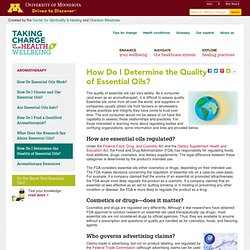
As a consumer (and even as an aromatherapist), it is difficult to assess quality. Essential oils come from all over the world, and suppliers or companies usually obtain oils from farmers or wholesalers whose practices and integrity they have come to trust over time. The end consumer would not be aware of (or have the capability to assess) those relationships and practices. For those interested in learning more about regulating bodies and certifying organizations, some information and links are provided below. How are essential oils regulated?
Under the Federal Food, Drug, and Cosmetic Act and the Dietary Supplement Health and Education Act, the Food and Drug Administration (FDA) has responsibility for regulating foods, food additives, drugs, cosmetics, and dietary supplements.